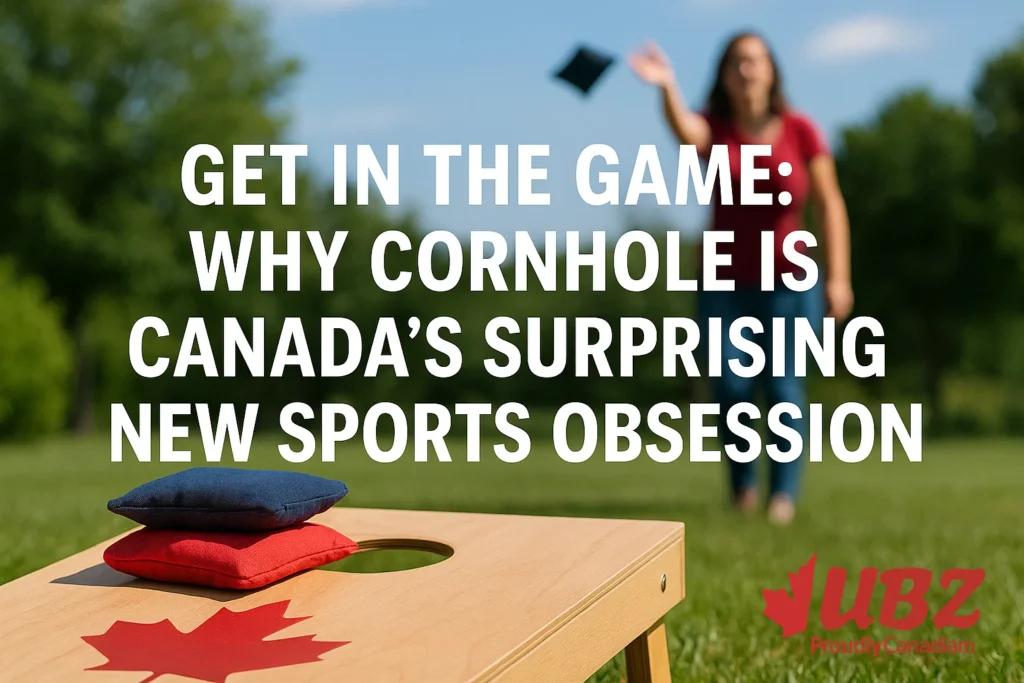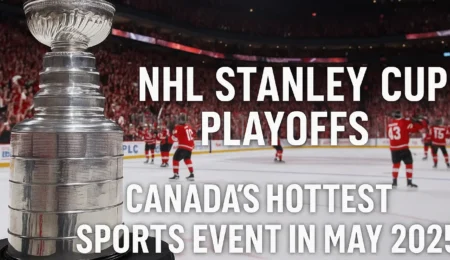Cornhole, once dismissed as a simple backyard pastime, is taking Canada by storm in 2025, emerging as one of the country’s fastest-growing sports. From casual gatherings to competitive leagues, this beanbag-tossing game is capturing the hearts of Canadians across all ages and skill levels. With its accessibility, social appeal, and growing professional scene, cornhole is no longer just a cottage game, it’s a cultural phenomenon with ambitions as big as the Olympics. Here’s why cornhole is Canada’s surprising new sports obsession and how you can join the fun.
The Rise of Cornhole in Canada
Cornhole’s journey from tailgates to televised tournaments is nothing short of remarkable. The game, which involves tossing beanbags onto a sloped board to score points (3 for a hole, 1 for landing on the board), has deep roots in North America. While its origins are debated, some trace it back to 14th-century Germany, others to Midwestern U.S. farmlands, it’s the modern era that’s seen cornhole explode. In Canada, the sport has gained traction over the past decade, fueled by its simplicity and inclusivity. As of 2024, Cornhole Canada reported 37 member leagues and 3,200 players, with hopes of reaching 5,000 in 2025, making Ontario the country’s cornhole hotbed.
The sport’s growth isn’t just about numbers. Cornhole’s appeal lies in its accessibility. “It’s a game anyone can play,” says Pino Panza, president of Cornhole Canada, emphasizing its low physical demands and universal appeal. Unlike hockey or soccer, cornhole requires no elite athleticism, just hand-eye coordination and practice. This inclusivity has made it a hit at community events, from backyard barbecues to corporate gatherings, where players of all backgrounds compete.

Why Cornhole Is Capturing Canadian Hearts
So, what’s driving this obsession? Several factors make cornhole a perfect fit for Canada’s diverse and social culture:
- Simplicity and Versatility: Cornhole’s rules are straightforward, and the equipment is minimal, just boards and bags. This simplicity allows it to be played anywhere, from beaches to warehouses. In Edmonton, the Tri-Muni Cornhole League launched in 2023 to bring players together year-round, with founder Sherry Colney noting its social draw: “It’s a very social game and a game anyone can play.”
- Social Connection: Cornhole thrives in social settings like tailgates, festivals, and family gatherings. Its relaxed vibe fosters camaraderie, making it a staple at Canadian events. As one Nova Scotia player shared on Reddit, “I joined a tight-knit neighborhood, and cornhole nights turned me into a competitive enthusiast.” The game’s ability to bring people together is a key reason for its surge.
- Pandemic Boost: The COVID-19 pandemic gave cornhole a massive push. As a socially distanced outdoor activity, it became a safe way to stay active and connected. Geoff Waterman, a regional director for the American Cornhole League (ACL), noted a 400% attendance spike in Sudbury post-pandemic, with ESPN’s coverage amplifying its visibility.
- Inclusivity for All: Cornhole Canada’s mission emphasizes inclusion, welcoming players regardless of age, gender, or background. This aligns with Canada’s push for inclusive sports, as seen in programs like the Community Sport for All Initiative. From kids to seniors, cornhole’s low barrier to entry makes it a sport for everyone.
From Backyards to Big Leagues
Cornhole’s evolution from a casual game to a competitive sport is a major driver of its popularity. In Canada, Cornhole Canada has standardized rules and organized events like the 2024 Canadian National Cornhole Championships in Maple Ridge, B.C. These events offer a structured environment for players, from recreational to pro levels, with dreams of global recognition. The organization’s goal? To make cornhole an Olympic sport, a vision shared by players and organizers worldwide.
The professional scene is heating up, too. In the U.S., the American Cornhole League (ACL) and American Cornhole Organization (ACO) host tournaments with prize pools reaching $50,000, some even broadcast on ESPN. Canada is catching up, with ACL events like the 2025 Quebec tournament drawing players from across the country. Professional players like Mark Richards, who practices three to four hours daily, highlight the skill involved: “It’s not a strength sport; it’s a skill sport.”
Celebrity involvement is also boosting cornhole’s profile. Stars like Jennifer Lopez and Chris Paul have played in charity matches, bringing mainstream attention. ESPN’s celebrity cornhole tournaments have made the sport a spectacle, inspiring casual players to upgrade their gear and join leagues. For UBZ advertisers, this trend opens doors to promote custom boards or event sponsorships.

The Tech and Business Boom
Cornhole isn’t just a game, it’s a growing industry. The global cornhole market is projected to hit $169.2 million in 2025, with Canada playing a big role. Retailers like Muskoka Cornhole and Canada Cornhole offer premium boards and bags, catering to both casual and competitive players. Custom boards, like those used at weddings or corporate events, are a hot trend, with free tote bags often included to sweeten the deal.
Technology is transforming the game, too. Apps for digital scoring and player stats, like those used by the ACL, add a modern edge. Universities are experimenting with “Smart Cornhole” boards using AI and sensors to track toss accuracy, hinting at a tech-driven future. For UBZ users, this creates opportunities to advertise tech-enhanced cornhole gear or apps, tapping into a tech-savvy audience.
How to Join the Cornhole Craze
Ready to get in the game? Here’s how Canadians can dive into cornhole:
- Join a League: Check out Cornhole Canada’s website for local leagues, like the Ottawa Cornhole League or Tri-Muni in Edmonton. These offer social and competitive play for all skill levels.
- Get Quality Gear: Invest in durable boards and bags from retailers like Amazon Canada or CSC Cornhole. Look for all-weather bags for year-round play.
- Practice and Compete: Start with backyard games, then try local tournaments. Consistent practice, as advised by LawnStarter, builds skills for competitive play. Watch ACL tutorials on YouTube for tips from pros.
Why Cornhole Matters for Canada
Cornhole’s rise reflects Canada’s love for community-driven, inclusive sports. Its low cost and portability make it ideal for urban and rural settings, from Toronto tailgates to Alberta community halls. As the sport grows, it’s creating economic opportunities, think local businesses selling boards or sponsoring tournaments. For UBZ users, this is a chance to tap into a passionate market, whether you’re a retailer, event organizer, or player.
The dream of cornhole as an Olympic sport may seem ambitious, but with Cornhole Canada’s leadership and global momentum, it’s not far-fetched. As Pino Panza says, “Every sport started somewhere.” For now, cornhole is bringing Canadians together, one toss at a time. So, grab a beanbag, find a board, and join the obsession, Canada’s cornhole craze is just getting started.




Leave a Reply